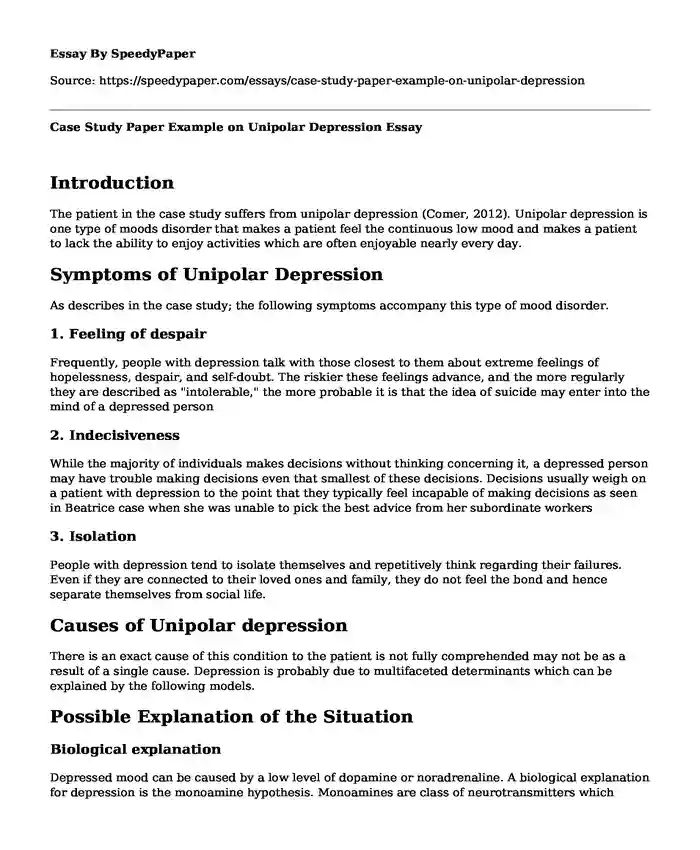
| Type of paper: | Case study |
| Categories: | Depression Psychological disorder |
| Pages: | 4 |
| Wordcount: | 888 words |
Introduction
The patient in the case study suffers from unipolar depression (Comer, 2012). Unipolar depression is one type of moods disorder that makes a patient feel the continuous low mood and makes a patient to lack the ability to enjoy activities which are often enjoyable nearly every day.
Symptoms of Unipolar Depression
As describes in the case study; the following symptoms accompany this type of mood disorder.
1. Feeling of despair
Frequently, people with depression talk with those closest to them about extreme feelings of hopelessness, despair, and self-doubt. The riskier these feelings advance, and the more regularly they are described as "intolerable," the more probable it is that the idea of suicide may enter into the mind of a depressed person
2. Indecisiveness
While the majority of individuals makes decisions without thinking concerning it, a depressed person may have trouble making decisions even that smallest of these decisions. Decisions usually weigh on a patient with depression to the point that they typically feel incapable of making decisions as seen in Beatrice case when she was unable to pick the best advice from her subordinate workers
3. Isolation
People with depression tend to isolate themselves and repetitively think regarding their failures. Even if they are connected to their loved ones and family, they do not feel the bond and hence separate themselves from social life.
Causes of Unipolar depression
There is an exact cause of this condition to the patient is not fully comprehended may not be as a result of a single cause. Depression is probably due to multifaceted determinants which can be explained by the following models.
Possible Explanation of the Situation
Biological explanation
Depressed mood can be caused by a low level of dopamine or noradrenaline. A biological explanation for depression is the monoamine hypothesis. Monoamines are class of neurotransmitters which control mood; they comprise of norepinephrine, serotonin, and dopamine. Among the mono transmitter, serotonin plays a function of regulating the other neurotransmitters (Pabba, M., & Sibille, 2016). Without the regulation offered by serotonin, brain functions become erratic. When serotonin levels are low, levels of noradrenaline reduces and noradrenaline release attention and reward. Low levels of norepinephrine are associated with a lack of pleasure. Moreover, low levels of serotonin are the sources of dropping of dopamine level, and dopamine is associated with attentiveness and energy. Low levels of dopamine are connected to unease
Psychodynamic Explanation
Freud claimed that persons who want were not realized during the oral phase of psychosexual growth are susceptible to developing depression in adulthood since this result to low self-esteem and excessive dependence (Balswick, King, & Reimer, 2016).
On the other side, perhaps the patient fall into the category of people whose need were fulfilled excessively during their oral phase are also vulnerable since they might too dependent on others. Balswick, King, and, Reimer (2016) claim that as per Freud, human beings are victims of their feelings, as suppression and dislocation are defense tools in reaction to actual loss (death of loved ones and symbolic loss (loss of status) which facilitate human beings to cope with the emotional disorder. But it can cause depression.
Persons who are extremely dependent on other individuals are perhaps likely to develop depression after a loss. Anger due to loss is evacuated onto the self, that impact on self-esteem and makes the individual re-experience loss which happened in childhood. Freud alleged that the superego is governed in the depressed individual and this gives an account of the extreme guilt experienced by many depressives.
Risk Factors: Stressors
The risk factor of the patient falls under socio-economic factors. According to socio-cultural theorists, e.g. Nolen- Hoeksema, 1990) claim that social and cultural elements influence the occurrence of primary depressive disorder. Marital status is a critical social factor; however, it is not stressor of her condition since she was in a stable marriage with the full support of the husband. Cultural might be the possible root of aggressor of her situation since it is believed that individuals in non-Western countries record mostly physical symptoms (e.g., fatigue and sleep disturbances), while guilt and self-blame are more common symptoms in Western countries (Haddad, M., & Boyce, 2017).
Treatment Recommendation
Psychotherapy therapy
The patient can be placed under psychotherapy treatment. Psychotherapy will assist you discuss feelings she has have regarding to only to herself but also other people, mainly family and those close to her like her co-workers ( Sue, D. W., Sue, D., Neville, & Smith, 2019) Psychotherapy is some case also provide a room for couples or families during the sessions.
References
Comer, R. J. (2012). Abnormal psychology. Macmillan.
Balswick, J. O., King, P. E., & Reimer, K. S. (2016). The reciprocating self: Human development in theological perspective. InterVarsity Press.Retrieved from: https://books.google.co.ke/books?hl=en&lr=&id=-vLIDAAAQBAJ&oi
Haddad, M., & Boyce, P. (2017). Fast Facts: Depression. Karger Medical and Scientific Publishers. Retrieved from: https://books.google.co.ke/books?hl=en&lr=&id=_V9uDwAAQBAJ&o
Pabba, M., & Sibille, E. (2016). GABA, depression and suicide. In Biological Aspects of Suicidal Behavior (Vol. 30, pp. 37-50). Karger Publishers. Retrieved from: https://www.karger.com/Article/Abstract/434736
Sue, D. W., Sue, D., Neville, H. A., & Smith, L. (2019). Counseling the culturally diverse: Theory and practice. Wiley. Retrieved from: https://books.google.co.ke/books?hl=en&lr=&id=9aKMDwAAQBAJ&oi
Cite this page
Case Study Paper Example on Unipolar Depression. (2022, Dec 15). Retrieved from https://speedypaper.com/essays/case-study-paper-example-on-unipolar-depression
Request Removal
If you are the original author of this essay and no longer wish to have it published on the SpeedyPaper website, please click below to request its removal:
- Favorite Food Essay Sample - Check It For Free
- Free Essay Sample: Epidemiology and Health Factors
- Education Essay Sample on Upward Bound Programs
- Food & Drug Administration Court Cases Analysis, Free Essay
- Free Essay on the Article: Overview and Findings from the Rush Memory and Aging Project
- Free Essay: The Bankrupt Bank of Justice
- Free Essay Sample. State Judges
Popular categories




